Key takeaways:
- Shared decision-making (SDM) empowers patients by involving them in treatment choices, fostering a collaborative relationship with healthcare providers.
- Decision support tools enhance the quality of discussions, allowing patients to weigh risks and benefits based on evidence tailored to their circumstances.
- Key principles of decision-making include clarity of goals, reliance on evidence-based information, and emotional intelligence, which together improve the decision-making process.
- Challenges in SDM include communication difficulties, time constraints during appointments, and self-doubt regarding decisions amidst conflicting medical opinions.
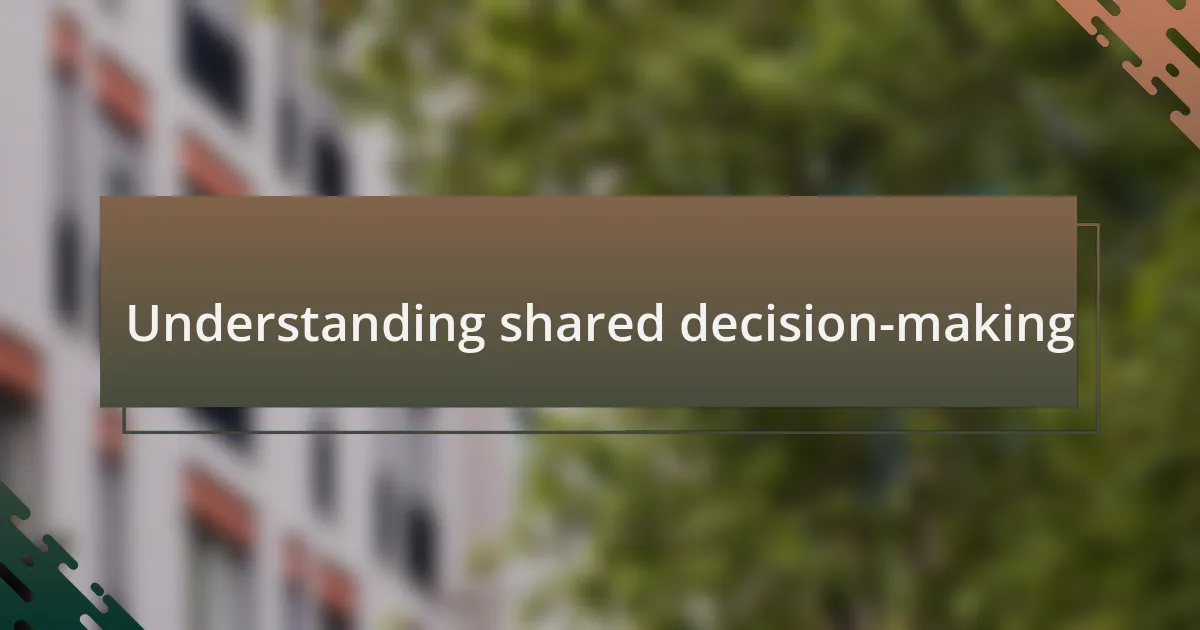
Understanding shared decision-making
Shared decision-making (SDM) is a process where both patients and healthcare providers collaborate to make informed choices about treatment options. I remember a time when I had to choose between two different medications for my chronic condition. The doctor didn’t just prescribe; instead, we discussed the pros and cons of each option, considering my lifestyle and preferences. It left me feeling empowered and more connected to my treatment.
At its core, SDM is about valuing the patient’s voice. I often wonder how many people, like me, have felt overwhelmed by medical choices. Engaging in conversations with my healthcare provider transformed my anxiety into curiosity. It made me realize that my insights were just as important as their expertise. This two-way dialogue fosters trust and ensures that decisions align with my values and needs.
Ultimately, understanding SDM means recognizing that healthcare is not a one-size-fits-all approach. I recall a colleague who shared her experience of being dismissed during a consultation. Had she been involved in decision-making, her journey might have been significantly different. This highlights the necessity of mutual respect and understanding in healthcare, ensuring that every voice is heard and valued in the process.
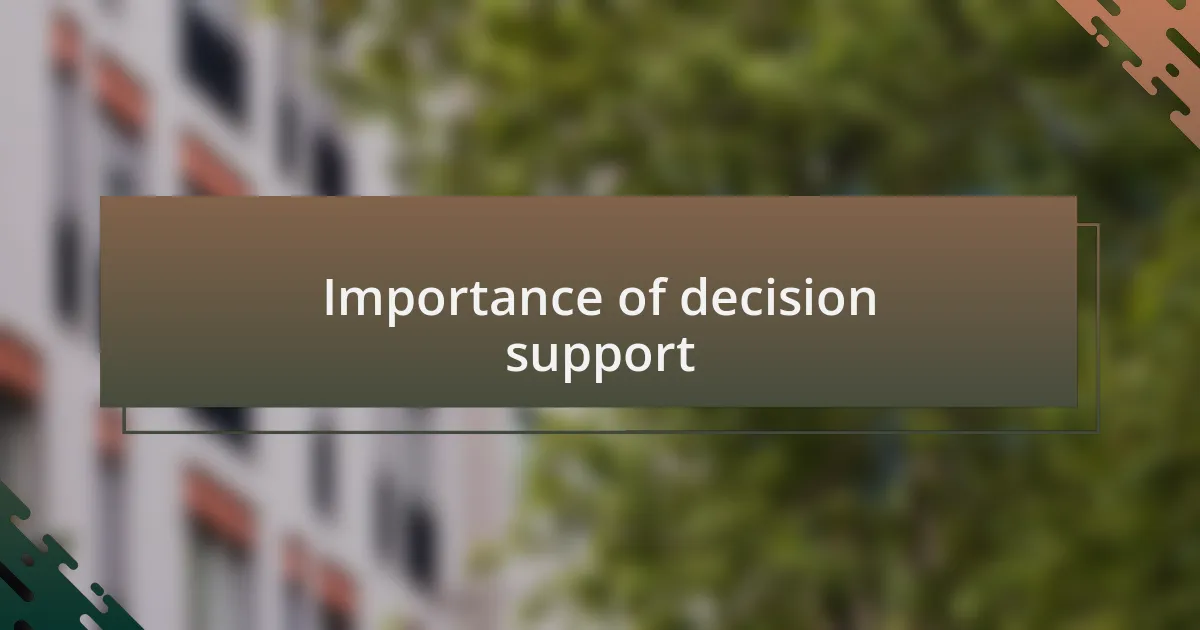
Importance of decision support
Decision support is crucial because it helps bridge the gap between clinical expertise and personal patient experience. I remember a time when I was facing a tough decision regarding a surgical procedure. With reliable decision support tools at my disposal, I was able to visualize the potential risks and benefits, leading me to a choice that felt right for me. It’s fascinating how having the right information at the right time can empower patients to make choices that resonate with their individual circumstances.
Moreover, decision support elevates the quality of conversations I have with healthcare providers. When armed with detailed insights and evidence, I’ve found that my questions become sharper, and my concerns are voiced more clearly. It’s like entering a dialogue with a co-pilot who understands the map, ensuring that our journey is both informed and intentional. How often have you wished for that clarity when discussing treatment options with your provider?
The emotional weight of decision-making is significant. I once faced the prospect of changing my lifestyle drastically due to a condition. With decision support, I could weigh emotional ramifications alongside physical outcomes, transforming what felt like an insurmountable hurdle into an achievable goal. This holistic approach to decision support is not just beneficial; it’s essential in forging a path that respects both my health and my emotional well-being.
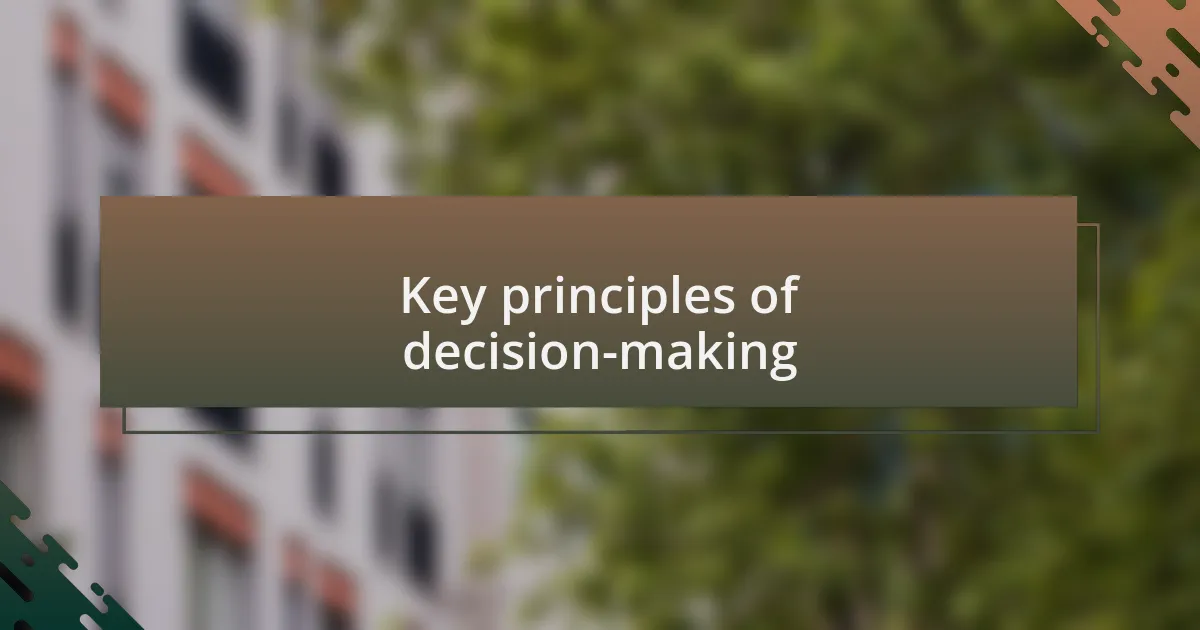
Key principles of decision-making
Understanding key principles of decision-making can significantly enhance how we approach healthcare choices. One principle I find vital is the importance of clarity in goals. When I had to select a treatment path, I first took the time to define what successful outcomes meant for me personally. This experience taught me that knowing what I truly wanted helped filter the options and made the ultimate decision clearer. Have you ever felt overwhelmed by choices? Perhaps mapping out your goals could help center your thoughts.
Another core principle is the value of evidence-based information. During my journey, I often turned to studies and data that addressed my specific condition. By assessing the evidence, I was able to distinguish between what was well-supported and what was merely anecdotal. This approach empowered me to engage meaningfully with my healthcare team. How much confidence would you feel if you could weigh the pros and cons backed by solid facts?
Lastly, the role of emotional intelligence cannot be overstated. Decision-making is as much about how we feel as it is about rational data. I recall a point where fear clouded my judgment, making it difficult to move forward. However, talking about my feelings and worries with a clinician helped contextualize my options. What if expressing those emotions is the key to unlocking clearer decisions? Acknowledging and processing our feelings can pave the way for choices that feel right at every level.
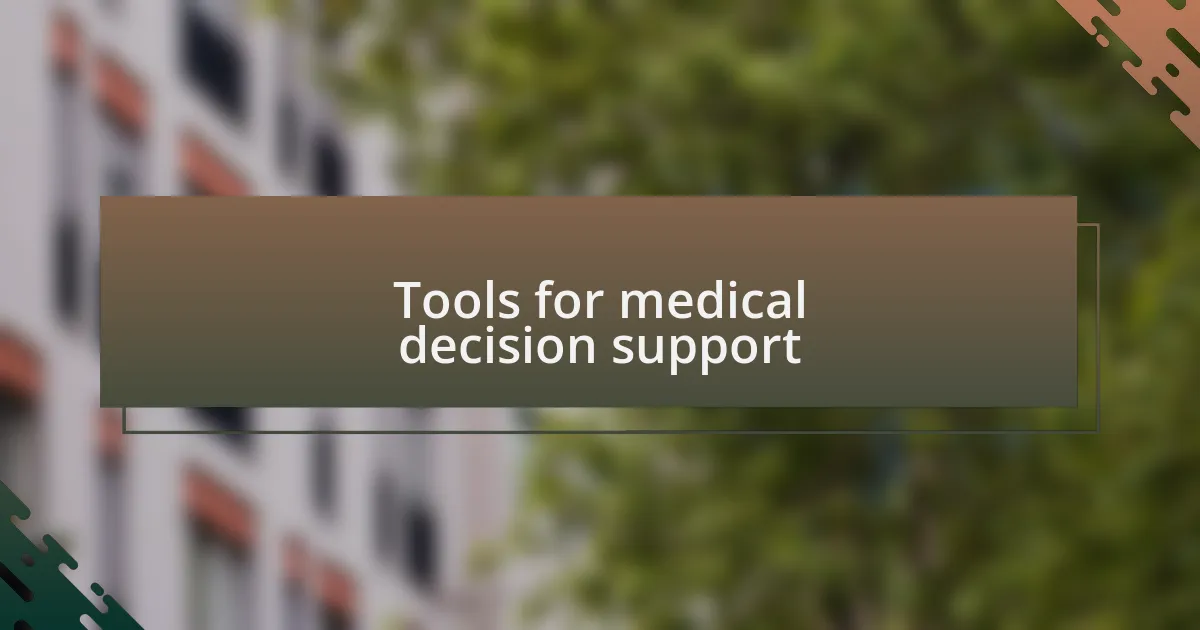
Tools for medical decision support
When it comes to tools for medical decision support, I found that shared decision-making aids can be invaluable. Utilizing online platforms available today, I accessed interactive tools that guided me through treatment options while illustrating potential outcomes based on my unique situation. Have you considered how technology might simplify overwhelming choices?
Decision-support software often features customizable algorithms. These algorithms can analyze patient data to present tailored recommendations. During my own journey, I used a tool that generated visual aids, allowing me to see the potential risks and benefits side by side. This was particularly reassuring; it felt as if I had a compass guiding me through murky waters.
I also discovered the power of communication tools. Many healthcare providers now offer apps that facilitate real-time conversations with professionals. For me, having quick access to my doctor via messaging meant I could clarify doubts and make more informed decisions. How much easier would it be to navigate your healthcare journey if you could instantly reach out for support?
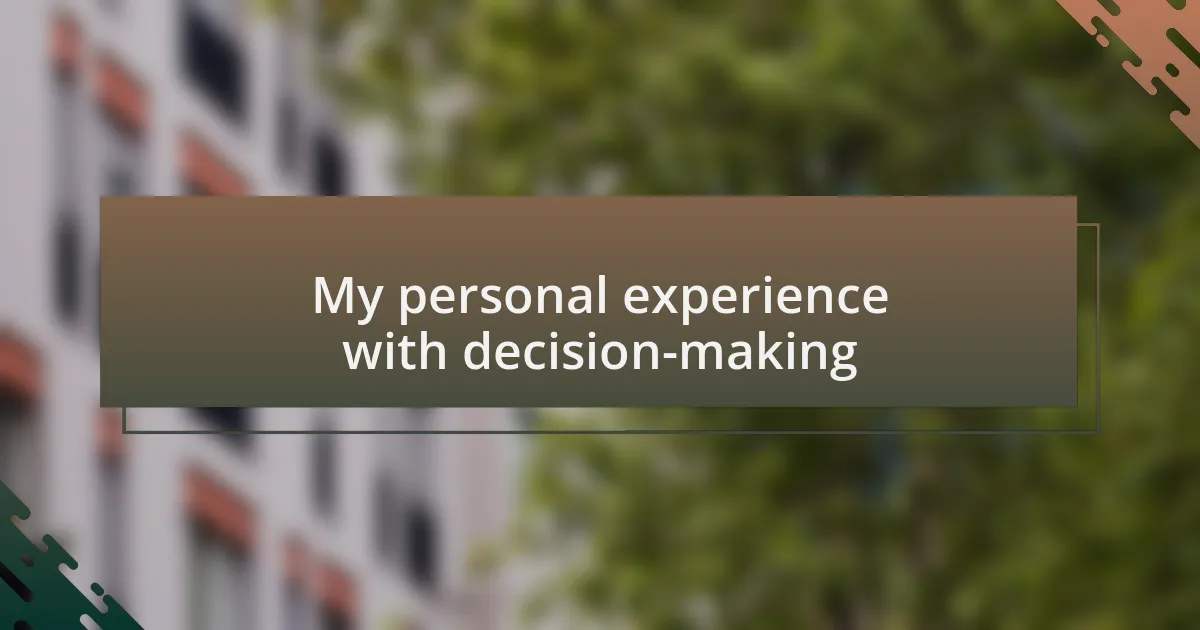
My personal experience with decision-making
Making decisions about my health has been a journey filled with complexity and emotion. I remember sitting in my doctor’s office, faced with multiple treatment options for my condition, feeling overwhelmed and unsure of what path to take. It was then that I realized the importance of asking questions and pushing for clarity; after all, my health was at stake.
During one particularly challenging decision, I engaged in a collaborative discussion with my healthcare team. As we weighed the pros and cons, I found myself feeling more empowered. It was like participating in a team sport; I wasn’t just a spectator but an active player in my health decisions. Can you imagine how liberating it felt to know I had a say in what happened to my body?
Looking back, I can see how reliance on technology and open communication transformed my experience. I often think about how different decisions might have been, had I not chosen to be proactive. Being involved in my own healthcare choices wasn’t just a necessity; it became an essential part of reclaiming my sense of agency during a time when I felt most vulnerable.
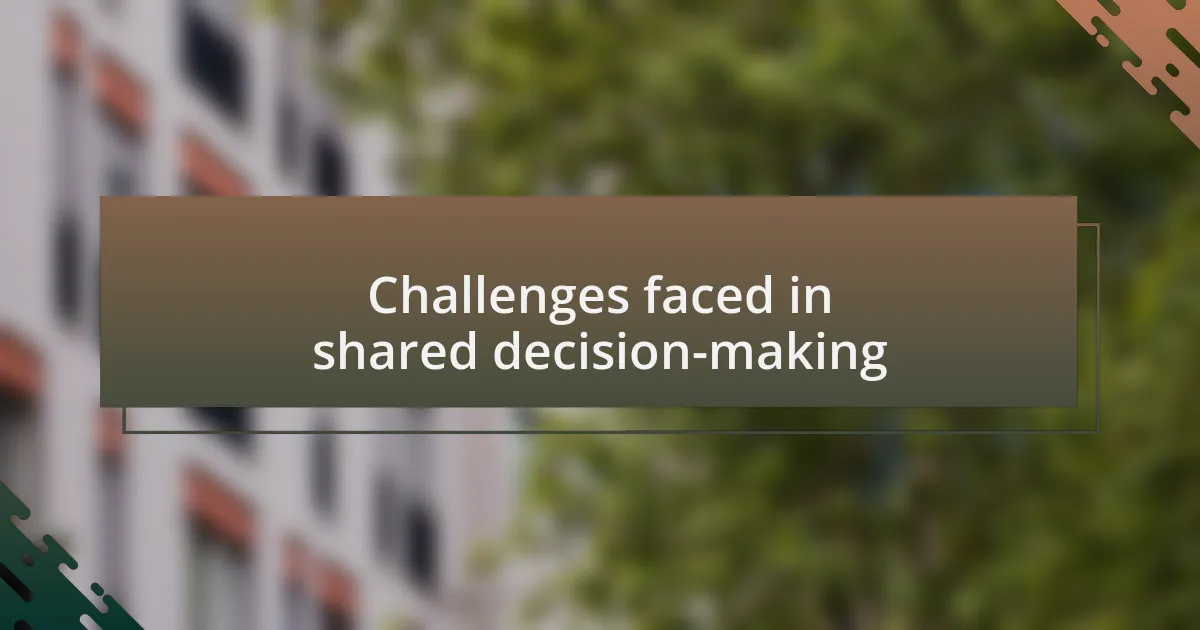
Challenges faced in shared decision-making
Navigating the complexities of shared decision-making can sometimes feel like walking a tightrope. I recall a particular moment when I struggled to communicate my preferences to my doctor amidst a sea of medical jargon. It left me feeling just as lost as when I first walked through the door. Have you ever felt that pressure in a medical setting, trying to translate your needs into their language?
Another hurdle I faced was time constraints during appointments. Often, I sensed that my discussions were rushed. While my doctor genuinely cared, the ticking clock seemed to overshadow the importance of thoughtful dialogue. I wondered, how can we expect to make informed decisions when we barely have time to articulate our concerns?
Sometimes, I found it challenging to trust my own judgment given the weight of the decisions at hand. I remember leaving a consultation with lingering doubts; the conflicting opinions of specialists added layers of confusion rather than clarity. Did I make the right choice? How could one patient’s experience vary so significantly from another’s? These doubts can feel isolating, even in a facilitated decision-making environment.